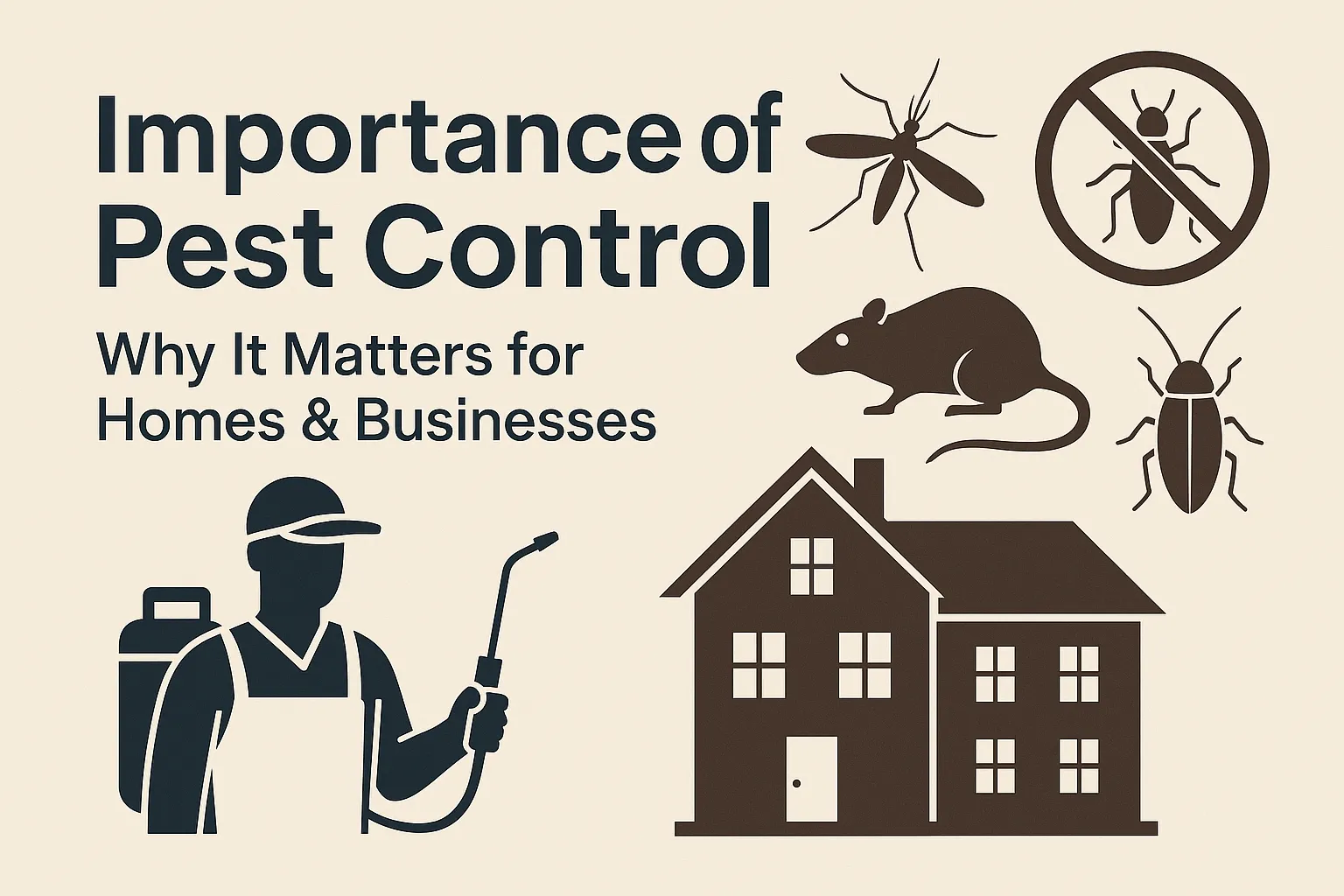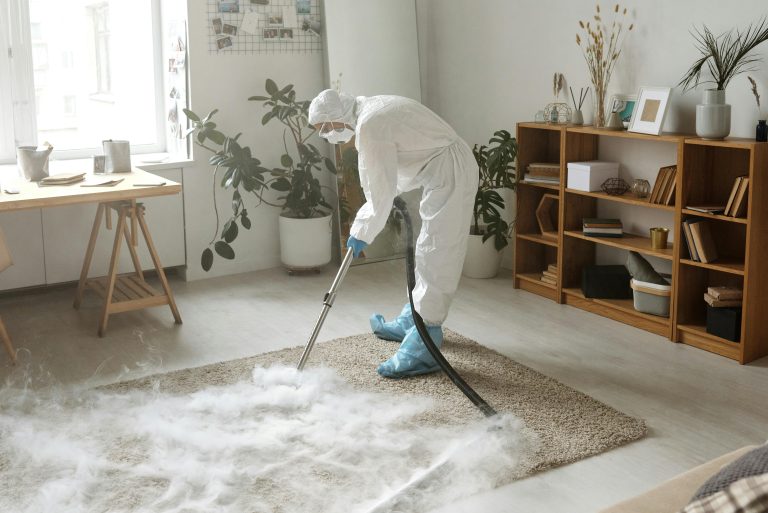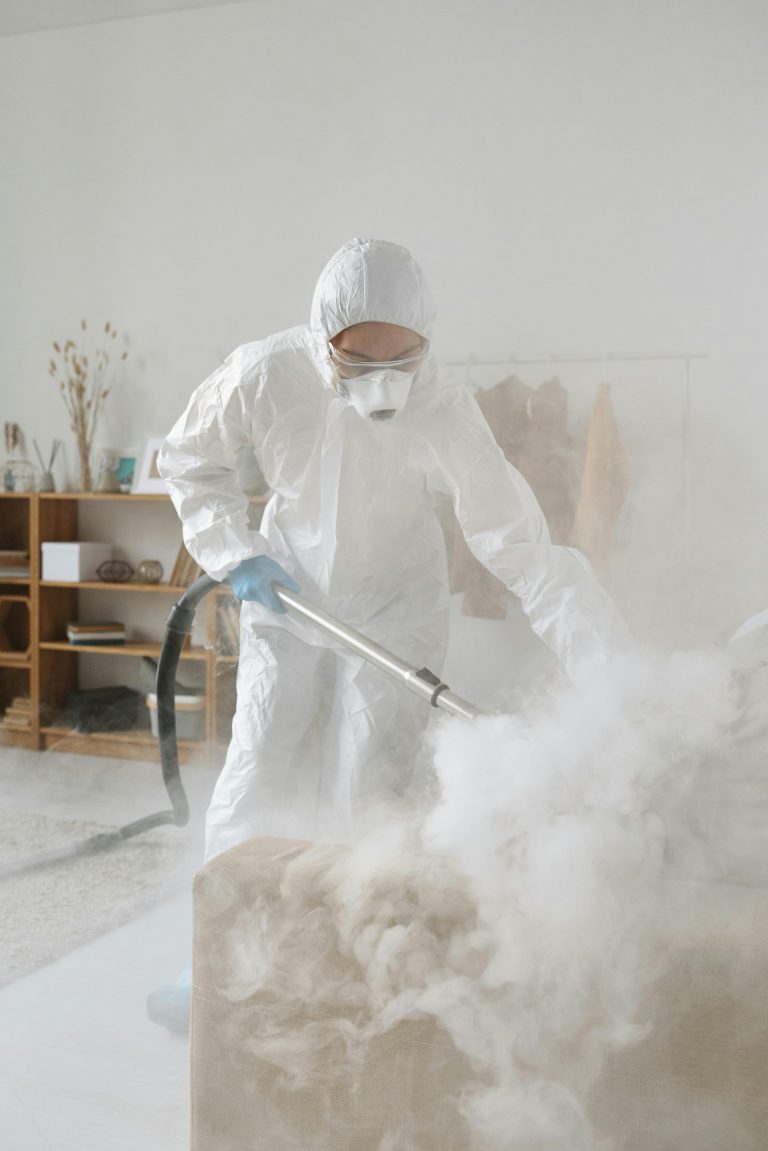Importance of Pest Control | Why It Matters for Homes & Businesses
Pest control plays a crucial role in maintaining a safe, clean, and healthy environment. Whether you’re a homeowner or a business operator, controlling unwanted pests is more than just a matter of comfort—it’s a fundamental aspect of safeguarding health, property, and reputation.
While some might see occasional pests as a minor nuisance, the reality is that infestations can escalate quickly, causing significant damage and posing serious health risks. That’s why understanding the importance of pest control is essential for both residential and commercial properties.
Health and Hygiene Benefits
One of the primary reasons pest control is so vital is due to its impact on health. Pests such as rodents, cockroaches, and mosquitoes can carry and transmit a variety of diseases. Rodents are known carriers of leptospirosis and hantavirus, while cockroaches can spread bacteria like Salmonella and E. coli. Mosquitoes are infamous for spreading malaria, dengue fever, and the West Nile virus.
In homes, these threats can endanger children, the elderly, and those with compromised immune systems. In commercial spaces—especially restaurants, hotels, and healthcare facilities—the risks are even greater. A single pest-related incident can lead to serious legal issues, health code violations, or damage to brand reputation.
Routine pest control helps eliminate these risks by targeting problem areas before they become hazardous. Preventative measures such as sealing entry points, proper waste management, and regular inspections reduce the chance of infestations that could put people at risk.
Protecting Property and Assets
Beyond health concerns, pests can cause considerable structural damage to buildings and assets. Termites are particularly notorious for their ability to silently destroy wooden structures from the inside out. Left unchecked, a termite colony can compromise the integrity of a home’s foundation, walls, and furniture.
Rodents are also a major concern for property damage. Their constant gnawing can chew through electrical wires, insulation, and even water pipes, increasing the risk of fires and water damage.
In a business setting, pests can damage inventory, machinery, and infrastructure. For example, warehouses with stored food products are at constant risk from rats and insects. Implementing a robust pest control strategy is essential to protect investments and reduce costly repairs or product losses.
Enhancing Comfort and Peace of Mind
Living or working in an environment overrun by pests can be extremely distressing. Constant sightings of bugs or rodents create an uncomfortable atmosphere, impacting quality of life and productivity. This is particularly true for families with children or pets, as well as businesses where customer experience is key.
Effective pest control restores peace of mind. Knowing that your property is protected against infestations allows you to focus on what matters most—whether that’s enjoying your home or running your business smoothly.
Preserving Food Safety
Pest control is especially critical in environments where food is prepared, served, or stored. In both residential kitchens and commercial food facilities, pests can contaminate food supplies and surfaces, leading to foodborne illnesses.
Ants, flies, and rodents are drawn to food sources and can quickly spread bacteria across preparation areas. In a household, this can affect the health of the entire family. In a restaurant or food processing plant, it can lead to failed health inspections, product recalls, or loss of consumer trust.
Routine pest management, combined with good hygiene practices, ensures compliance with food safety standards and protects the integrity of consumable goods.
Legal Compliance and Reputation Management
For businesses, pest control isn’t just about comfort or cleanliness—it’s a regulatory necessity. Many industries are required by law to maintain pest-free environments. Failure to do so can result in fines, closures, or litigation.
Hotels, hospitals, schools, and food establishments must adhere to stringent health and safety codes. One pest sighting reported by a customer or patient can result in a public relations disaster, damaging a company’s reputation permanently.
Regular pest inspections and treatments demonstrate due diligence, reduce liability, and help companies maintain a trustworthy brand image.
Eco-Friendly and Preventive Solutions
Modern pest control isn’t just about chemical sprays and traps. Today’s methods emphasize environmentally responsible solutions that target pests while minimizing harm to people, pets, and the planet. Integrated Pest Management (IPM) is a popular approach that combines prevention, monitoring, and targeted treatments for sustainable results.
Using eco-conscious pest control techniques not only protects the environment but also ensures compliance with evolving regulations. Whether you choose professional services or take a DIY approach, focusing on prevention is always more effective and economical than dealing with a full-blown infestation.
Cost Savings Over Time
Many people hesitate to invest in pest control because they view it as an unnecessary expense—until it’s too late. By the time an infestation is visible, the damage may already be extensive, leading to higher costs for extermination, repairs, or medical treatment.
Preventative pest control is a proactive investment that saves money in the long run. It helps detect issues early, reduces the risk of emergencies, and extends the lifespan of your property and belongings.
For business owners, consistent pest management is often cheaper than handling customer complaints, product loss, or legal penalties.
Custom Solutions for Homes and Businesses
Every property has unique needs when it comes to pest control. Homes may deal more often with ants, spiders, or bed bugs, while businesses might struggle with rodents, flies, or termites. The good news is that pest control solutions can be tailored to meet these specific challenges.
Professional pest control providers conduct thorough inspections and develop targeted plans to address individual risks. Whether it’s sealing cracks, installing traps, or applying safe treatments, a customized approach ensures optimal results.
Building a Safer, Healthier Future
At its core, pest control is about creating environments where people can live, work, and thrive without the constant threat of pests. It plays a vital role in public health, property protection, food safety, and overall well-being.
Ignoring the need for proper pest management not only invites trouble—it actively endangers what matters most. Whether you’re a homeowner trying to keep your family safe or a business owner protecting your brand, taking pest control seriously is a smart and responsible decision.
Conclusion
The importance of pest control cannot be overstated. From protecting health and property to maintaining legal compliance and ensuring peace of mind, it serves as a critical line of defense against a host of potential problems. By adopting preventive strategies and working with qualified professionals, both homes and businesses can stay one step ahead of pests—and enjoy the comfort and security they deserve.



